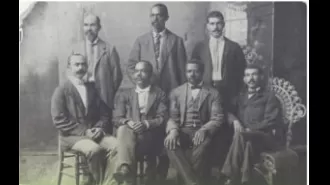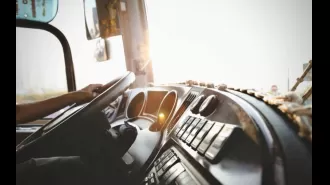Many popular 90s songs, including a famous hit, contain hidden samples.
Which ones are you familiar with?
August 30th 2024.

Do you know any of these songs already? Sampling has been a common practice in pop music for as long as it has been recorded. This term refers to the reuse of previously recorded material in a new song. It has been around for almost a century and has become a defining feature of modern pop music. Many popular songs pay homage to the past by incorporating elements from older songs to boost their popularity. Artists like Jay Z, Kanye West, Robbie Williams, and The Beatles have all taken advantage of sampling and it will likely continue to be used as long as pop music exists. Sometimes, the sample is easily recognizable, but other times it takes some research to uncover where it came from. Here are a few tracks that you may not have realized contain samples.
Let's start with Miley Cyrus' "We Can't Stop". Despite being released over a decade ago, it's still hard to forget the transformation of this former Disney star into a controversial R&B icon. The song was a huge success, reaching the top three on both sides of the Atlantic and selling millions of copies. But did you know that the catchy chorus, "La-da-di da-di, we like to party", was actually taken from a song released almost ten years before Miley was even born? This can be traced back to Doug E Fresh and Slick Rick's 1985 hit "La Di Da Di", which heavily influenced one of the biggest songs of 2013. "La Di Da Di" has been sampled by many other artists, including Robbie Williams, A Tribe Called Quest, Black Eyed Peas, and even Miley's collaborator on "We Can't Stop", rapper Pusha T.
Moving on to Jason Derulo's debut single, "Whatcha Say". This song propelled him to number one in America and reached the top three in the UK. Even after 15 years and numerous other hits, "Whatcha Say" is still considered to be Jason's signature tune. The iconic chorus was actually taken from singer-songwriter Imogen Heap's 2005 song "Hide and Seek". This song didn't even make the top 100 in the UK when it was first released, but its use in a popular TV show and various parodies brought it to the public's attention. As of 2024, "Hide and Seek" is certified Silver in the UK and was even performed by Imogen at the One Love Manchester concert in 2017, in front of a crowd of 50,000 people.
Next up, we have Coolio's "Gangsta's Paradise". This song was a massive hit in the 1990s and made Coolio a household name. It reached number one in many countries, including the UK, where it sold over two million copies. The chorus and iconic string section were actually sampled from Stevie Wonder's 1976 album "Songs in the Key of Life". Stevie never released the song "Pastime Paradise" as a single, but Coolio got his hands on it and created a superhit. Stevie even received writing credits for "Gangsta's Paradise". Sadly, Coolio passed away in 2022 at the age of 59, exactly 46 years after "Songs in the Key of Life" was released.
Finally, we have Mutya Buena's "Real Girl". This song was a huge success, reaching number two in the UK and the top ten in several European countries. It was praised for its blend of contemporary R&B with 1970s pop soul. However, one of the writing credits on the song may have surprised some people. Lenny Kravitz, a 90s singer and guitarist, is listed as one of the writers. This is because "Real Girl" sampled the instrumental from Lenny's 1991 hit, which reached number two in America and was certified Silver in the UK.
In conclusion, sampling has been a common practice in pop music for many years and has been used by numerous artists to create successful songs. It's always interesting to discover where these samples come from and how they have been incorporated into new songs. Who knows, maybe some of your favorite songs contain hidden samples that you never knew about.
Do you already know any of these songs? Sampling has been a part of pop music for almost a century, allowing artists to pay tribute to the past by incorporating elements of old songs into new ones. It's a common practice that has been used by everyone from Jay Z and Kanye West to Robbie Williams and The Beatles, and will likely continue as long as pop music exists.
Sometimes, the use of a sample is immediately recognizable to listeners, while other times it takes a bit of digging to uncover its origin. Here are a few tracks that may surprise you with their sneaky samples.
Let's start with Miley Cyrus's "We Can't Stop." Released in 2013, this controversial R&B hit became a huge success, selling almost 10 million copies in the UK and US alone. But did you know that its catchy hook, "La-da-di da-di, we like to party," was actually taken from a song released almost a decade before Miley was even born? The credit goes to Doug E Fresh and Slick Rick, whose 1985 track "La Di Da Di" served as the inspiration for this modern hit. "La Di Da Di" has also been sampled by numerous other artists, including Robbie Williams, A Tribe Called Quest, and Kanye West.
Next up is Jason Derulo's "Whatcha Say." This debut single from 2005 became an instant hit, reaching number one in America and top three in the UK. Its iconic chorus was actually lifted from Imogen Heap's 2005 song "Hide and Seek." While "Hide and Seek" didn't make a big splash when it was first released, its use in a scene from the TV show "The O.C." helped introduce it to a wider audience. In 2024, the song was certified Silver in the UK, and Imogen even performed it live at the One Love Manchester concert in 2017.
Moving on to the 1990s, we have Coolio's "Gangsta's Paradise." This smash hit, which topped charts around the world, was based on a sample from Stevie Wonder's 1976 album "Songs in the Key of Life." The song, "Pastime Paradise," was never released as a single, but when Coolio got his hands on it, he turned it into a superhit. Sadly, Coolio passed away in 2022 at the age of 59, exactly 46 years after "Songs in the Key of Life" was released.
Lastly, let's talk about Mutya Buena's "Real Girl." This song, released in 2007, became a hit thanks to its blend of contemporary R&B and 70s pop soul. But what you may not have known is that the instrumental was borrowed from Lenny Kravitz's 1991 song "It Ain't Over 'Til It's Over." "It Ain't Over 'Til It's Over" reached number two in America and was certified Silver in the UK. The fact that Lenny Kravitz is credited as a writer on "Real Girl" may have come as a surprise to some listeners.
Let's start with Miley Cyrus' "We Can't Stop". Despite being released over a decade ago, it's still hard to forget the transformation of this former Disney star into a controversial R&B icon. The song was a huge success, reaching the top three on both sides of the Atlantic and selling millions of copies. But did you know that the catchy chorus, "La-da-di da-di, we like to party", was actually taken from a song released almost ten years before Miley was even born? This can be traced back to Doug E Fresh and Slick Rick's 1985 hit "La Di Da Di", which heavily influenced one of the biggest songs of 2013. "La Di Da Di" has been sampled by many other artists, including Robbie Williams, A Tribe Called Quest, Black Eyed Peas, and even Miley's collaborator on "We Can't Stop", rapper Pusha T.
Moving on to Jason Derulo's debut single, "Whatcha Say". This song propelled him to number one in America and reached the top three in the UK. Even after 15 years and numerous other hits, "Whatcha Say" is still considered to be Jason's signature tune. The iconic chorus was actually taken from singer-songwriter Imogen Heap's 2005 song "Hide and Seek". This song didn't even make the top 100 in the UK when it was first released, but its use in a popular TV show and various parodies brought it to the public's attention. As of 2024, "Hide and Seek" is certified Silver in the UK and was even performed by Imogen at the One Love Manchester concert in 2017, in front of a crowd of 50,000 people.
Next up, we have Coolio's "Gangsta's Paradise". This song was a massive hit in the 1990s and made Coolio a household name. It reached number one in many countries, including the UK, where it sold over two million copies. The chorus and iconic string section were actually sampled from Stevie Wonder's 1976 album "Songs in the Key of Life". Stevie never released the song "Pastime Paradise" as a single, but Coolio got his hands on it and created a superhit. Stevie even received writing credits for "Gangsta's Paradise". Sadly, Coolio passed away in 2022 at the age of 59, exactly 46 years after "Songs in the Key of Life" was released.
Finally, we have Mutya Buena's "Real Girl". This song was a huge success, reaching number two in the UK and the top ten in several European countries. It was praised for its blend of contemporary R&B with 1970s pop soul. However, one of the writing credits on the song may have surprised some people. Lenny Kravitz, a 90s singer and guitarist, is listed as one of the writers. This is because "Real Girl" sampled the instrumental from Lenny's 1991 hit, which reached number two in America and was certified Silver in the UK.
In conclusion, sampling has been a common practice in pop music for many years and has been used by numerous artists to create successful songs. It's always interesting to discover where these samples come from and how they have been incorporated into new songs. Who knows, maybe some of your favorite songs contain hidden samples that you never knew about.
Do you already know any of these songs? Sampling has been a part of pop music for almost a century, allowing artists to pay tribute to the past by incorporating elements of old songs into new ones. It's a common practice that has been used by everyone from Jay Z and Kanye West to Robbie Williams and The Beatles, and will likely continue as long as pop music exists.
Sometimes, the use of a sample is immediately recognizable to listeners, while other times it takes a bit of digging to uncover its origin. Here are a few tracks that may surprise you with their sneaky samples.
Let's start with Miley Cyrus's "We Can't Stop." Released in 2013, this controversial R&B hit became a huge success, selling almost 10 million copies in the UK and US alone. But did you know that its catchy hook, "La-da-di da-di, we like to party," was actually taken from a song released almost a decade before Miley was even born? The credit goes to Doug E Fresh and Slick Rick, whose 1985 track "La Di Da Di" served as the inspiration for this modern hit. "La Di Da Di" has also been sampled by numerous other artists, including Robbie Williams, A Tribe Called Quest, and Kanye West.
Next up is Jason Derulo's "Whatcha Say." This debut single from 2005 became an instant hit, reaching number one in America and top three in the UK. Its iconic chorus was actually lifted from Imogen Heap's 2005 song "Hide and Seek." While "Hide and Seek" didn't make a big splash when it was first released, its use in a scene from the TV show "The O.C." helped introduce it to a wider audience. In 2024, the song was certified Silver in the UK, and Imogen even performed it live at the One Love Manchester concert in 2017.
Moving on to the 1990s, we have Coolio's "Gangsta's Paradise." This smash hit, which topped charts around the world, was based on a sample from Stevie Wonder's 1976 album "Songs in the Key of Life." The song, "Pastime Paradise," was never released as a single, but when Coolio got his hands on it, he turned it into a superhit. Sadly, Coolio passed away in 2022 at the age of 59, exactly 46 years after "Songs in the Key of Life" was released.
Lastly, let's talk about Mutya Buena's "Real Girl." This song, released in 2007, became a hit thanks to its blend of contemporary R&B and 70s pop soul. But what you may not have known is that the instrumental was borrowed from Lenny Kravitz's 1991 song "It Ain't Over 'Til It's Over." "It Ain't Over 'Til It's Over" reached number two in America and was certified Silver in the UK. The fact that Lenny Kravitz is credited as a writer on "Real Girl" may have come as a surprise to some listeners.
[This article has been trending online recently and has been generated with AI. Your feed is customized.]
[Generative AI is experimental.]
0
0
Submit Comment





